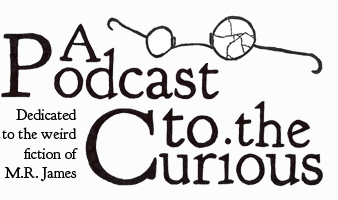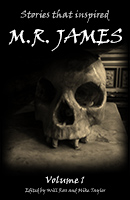 In this episode Mike & Will look into ghosts, golf and some decidedly fishy goings-on in Felixstowe in the first of a 2-part special on M.R. James’s ‘Oh, Whistle, and I’ll Come to You, My Lad’!
In this episode Mike & Will look into ghosts, golf and some decidedly fishy goings-on in Felixstowe in the first of a 2-part special on M.R. James’s ‘Oh, Whistle, and I’ll Come to You, My Lad’!
Big thanks to Tom Hemmings who returns as our reader for this episode.
Show Notes
- ‘Oh, Whistle and I’ll Come to You, My Lad’ by M.R. James
Read the full text at Wikisource. - Felixstowe Golf Course and Beach on GoogleMaps
Here can be seen the real-world setting of ‘Oh, Whistle…’ - 1968 TV version on Youtube
Watch the BBCs classic adaptation, starring Michael Horden. - 2010 TV version on IMDB
Read about the BBCs recent tv adaptation, starring John Hurt. - Review of the 2010 TV version at The Gothic Imagination
Includes some very interesting discussion in the comments section. - The Quadruple Object and Ontography
A website explaining the area of modern study now known at Ontography. - Pilgrim’s Progress Quote
This is the section of John Bunyan’s Pilgrim’s Progress that comes to Parkins’ mind when seeing a figure following him along the beach. - “I Shall Most Likely Be out on the Links”: Golf as Metaphor in the Ghost Stories of M. R. James. by Terry W. Thompson
A really interesting essay relevant to this story. - The meaning of “Fur/Fla/Fle/Bus” at Ghosts & Scholars
Ghosts & Scholars provides a summary of the various speculations about the meaning of the text found on the whistle. - Photo of the beach below Cobbolds Point, Felixstowe circa 1900
The more touristy part of the beach at Felixstowe, south of where Parkins had his horrible experience. - Info on the Felixstowe Bath Hotel | Photo of Felixstowe Bath Hotel
This is the hotel on which James based The Globe Inn in ‘Oh, Whistle…’. The hotel is sadly no more, having been burned down by Suffragette arsonists on April 28th 1914! - Image of ‘The Lodge’ Felixstowe | ‘The Lodge’ on GoogleMaps
This is the house owned by James’s friend Felix Cobbold, and where parties of friends from Kings College would meet for holidays (and probably a round of golf or two at the nearby golf course). - Penelope Fitzgerald on M.R. James
In this 2000 article for the Guardian, author Penelope Fitzgerald examines James the man as well as James the writer and compares James’s personality to that of Parkins in ‘Oh, Whistle…’ - ‘Bleak and Solemn…’ at k-punk
This article retraces the Norfolk and Suffolk locations used in the filming of the 1960’s TV versions of ‘Oh, Whistle…’ and ‘A Warning to the Curious’. Photos are provided to show the locations as they are today (well, in 2007). - Knights Templar on Wikipedia
Read about the history of this much-maligned order of religious knights.
Podcast: Play in new window | Download
Subscribe: RSS
Tags: Burnstow, Felixstowe, Golf, John Hurt, Knights Templar, M.R. James, Michael Horden, Montague Rhodes James, Oh Whistle and I'll Come to You My Lad, Parkins, Ruins, The Globe Inn








It seems that we can safely add ‘small boys’ to M.R.’s list of pet hates..the account of Parkins discovery of the remains of teh Templar site notes that the area of the ruin had perhaps been disturbed in the past by small boys or ‘other creatures!’
I kind of see Parkins’ reluctance to admit the supernatural exists is a matter of academic pride. Ontography sounds like a field that overlaps a lot of other subjects (or should I say ‘disciplines’) and may not get much funding or respect from others. To have him, and by extension, ontography, associated with ghosts and other ‘woo’ subjects would mean the end of his academic career, or any career that would pay, really. I almost wonder if Parkins is the ontography department, and is involved in the administrative tangles.
‘Baphomet’ FYI seems to have been a corruption of ‘Mohammed’ which the early Crusaders took to be some sort of pagan deity worshipped by the Muslims. Comparative theology was not a subject much encouraged by the medieval Church.
When the French crown needed something to slander the Templars with (so as to allow them to dissolve the Order, write off their debts to the clerical banking arm and seize their assets) ‘Baphomet’ got dragged out and elaborated. Most of the stuff about the Sabbat Goat and what have you is later made up nonsense. (As opposed to contemporary made up nonsense.)
It should be noted (and is at the Wikipedia article above) that the Pope actually forgave the Templars shortly after the whole mess but did so secretly, presumably because he was afraid of the wrath of the French. The 21st century Vatican is perfectly happy to admit that the whole dissolution was unjust and the accusations of demonolatry were slander.
It occurs to me that Parkins’ reluctance to have a spare bed in his room is a premonition of trouble, or perhaps just MRJ planting one for the reader. It reminds me of the reference to “poor Mr Dunning” early in “Casting the Runes”, long before anything has actually happened to him.
I may be entirely wrong about this, though I seem to remember from various stories and historical titbits that it wasn’t unknown for innkeepers to double-book rooms, so that you could find yourself unexpectedly sharing rooms. People generally had less idea of personal space, so it was common for commercial travellers and others to share rooms – and even, at times, beds – with complete strangers and take it in their stride. The upper classes, of course, had a completely different attitude, and the more genteelly “impoverished”* gentry might find themselves unable to afford digs that guaranteed privacy while still hanging on to their expectations.
* And by “impoverished”, I mean able to access all sorts of things and activities that most people would consider massive luxuries, like an education or health care or rare books, etc., while not being able to cover their expenses.
Patrick Murphy’s new book (Ep. 59 notes) establishes “Fur, Flabis, Flebis” as the correct reading by consulting the original MS., where James had earlier written
FLA
FUR > BIS
FLE
He also shows how the swastikas in the “Quis Est…” inscription were a little differently drawn by James in the MS. as a further clue to this, but surmises they were replaced with the standard swastikas by the printer.
Hmm. Extra spaces were deleted above. Let’s try
….FLA
FUR….> BIS
….FLE
I listened to this a while ago, and don’t remember a mention of the Robert Burns poem the title comes from. Maybe I missed it.
I’ve always assumed that the episode when the storm blows up suddenly and Parkins has to struggle to close the casement as if against a sturdy burglar is the point at which the supernatural creature enters the room.
Love the attempts to read Latin. Must be tongue in cheek humour though, as I cannot believe you two are not au fait with the language. Probably a couple of closet public schoolboys.
Its Cobb-old, not Co-bold!